(完整)外研版七年级上英语重点语法
外研版英语七年级上册复习资料

Module1Module2I.重点短语:I.重点短语:1.befrom...=comefrom...1.来自......1.aphotoofTony’sfamily1.一XTony的家庭的照片2....yearsold2.......岁2.ontheleftof.....2.在......的左边3.whatabout...=howabout...3.......怎么样?3.nextto.....3.紧挨着.....;紧靠......4.inClassTen,GradeSeven4.在七年级十班4.infrontof......4.在......前面〔分开〕5.thecapitalof...5......的首都/省会in/atthefrontof......在......前面〔没有分开〕6.firstname=givenname6.名5.Tony’sparents5.Tony的父母stname=familyname7.姓6.inthephoto6.照片上8.Englishname8.英文名字7.atthebusstation7.在公共车站9.Chinesename9.中文名字8.atapolicestation8.在警察局II.重点句子:9.amanagerofatheater9.一位剧院负责人1.I’mChinese,andI’mfrom1.我是中国人,我来自中国.=atheatermanagerChina.10.amanagerofahotel10.一位宾馆经理(I’mChinese,andIcome2.他们来自什么哪里?=ahotelmanagerfromChina.)11.at/inthesamehospital11.在同一家医院他们来自美国.2.Wherearetheyfrom?12.abusdriver12.一位公共汽车司机(=Wheredotheycome13.afarmworker13.一位农场工人from?)14.ashopworker14.一名店员TheyarefromAmerica.15.anEnglishteacher15.一位英语教师(=TheycomefromII.重点句子:America.)1.ThisisaphotoofTony’s1.这是Tony的一X全家福。
外研版七年级上册各单元重点单词短语句型
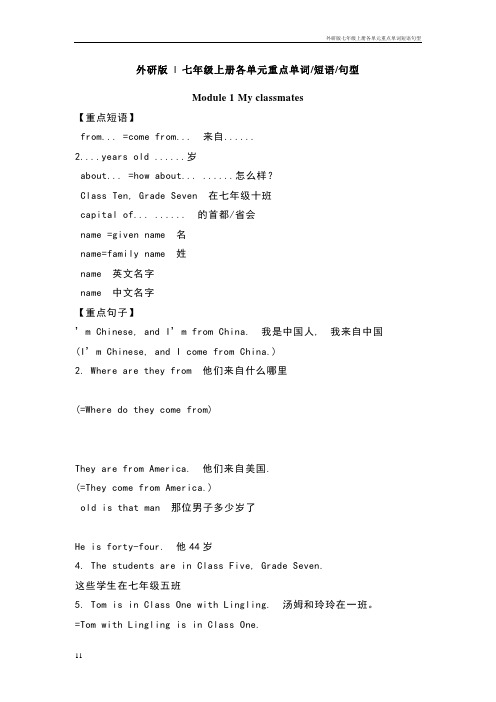
外研版| 七年级上册各单元重点单词/短语/句型Module 1 My classmates【重点短语】from... =come from... 来自......2....years old ......岁about... =how about... ......怎么样?Class Ten, Grade Seven 在七年级十班capital of... ...... 的首都/省会name =given name 名name=family name 姓name 英文名字name 中文名字【重点句子】’m Chinese,and I’m from China. 我是中国人, 我来自中国(I’m Chinese, and I come from China.)2. Where are they from 他们来自什么哪里(=Where do they come from)They are from America. 他们来自美国.(=They come from America.)old is that man 那位男子多少岁了He is forty-four. 他44岁4. The students are in Class Five, Grade Seven.这些学生在七年级五班5. Tom is in Class One with Lingling. 汤姆和玲玲在一班。
=Tom with Lingling is in Class One.=Tom and Lingling are in Class One.about you=How about you=And you你呢/你怎么样to Class 6 Grade 7 ! 欢迎到七年级六班。
8. Beijing is the capital of China. 北京是中国的首都。
to see you.=Nice to see you.=Glad to see you. 很高兴见到你。
外研版七年级上册重点短语及句子
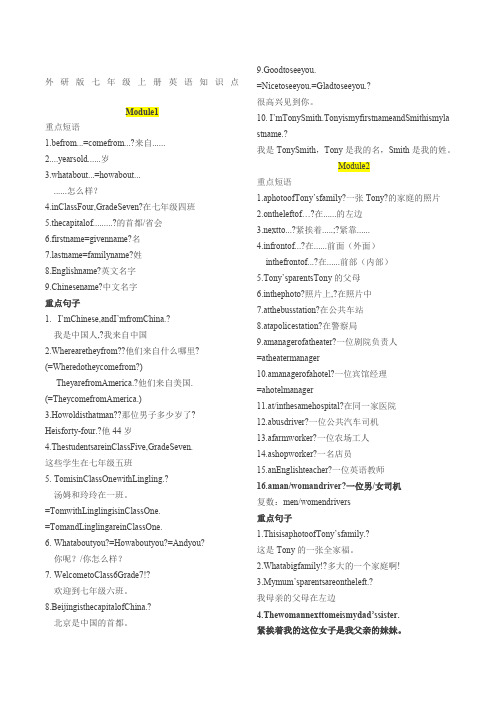
外研版七年级上册英语知识点Module1重点短语1.befrom...=comefrom...?来自......2....yearsold......岁3.whatabout...=howabout.........怎么样?4.inClassFour,GradeSeven?在七年级四班5.thecapitalof.........?的首都/省会6.firstname=givenname?名stname=familyname?姓8.Englishname?英文名字9.Chinesename?中文名字重点句子1.I’mChinese,andI’mfromChina.?我是中国人,?我来自中国2.Wherearetheyfrom??他们来自什么哪里?(=Wheredotheycomefrom?)TheyarefromAmerica.?他们来自美国.(=TheycomefromAmerica.)3.Howoldisthatman??那位男子多少岁了?Heisforty-four.?他44岁4.ThestudentsareinClassFive,GradeSeven.这些学生在七年级五班5.TomisinClassOnewithLingling.?汤姆和玲玲在一班。
=TomwithLinglingisinClassOne.=TomandLinglingareinClassOne.6.Whataboutyou?=Howaboutyou?=Andyou?你呢?/你怎么样?7.WelcometoClass6Grade7!?欢迎到七年级六班。
8.BeijingisthecapitalofChina.?北京是中国的首都。
9.Goodtoseeyou.=Nicetoseeyou.=Gladtoseeyou.?很高兴见到你。
10.I’mTonySmith.TonyismyfirstnameandSmithismyla stname.?我是TonySmith,Tony是我的名,Smith是我的姓。
外研版七年级上英语重点语法总结与练习
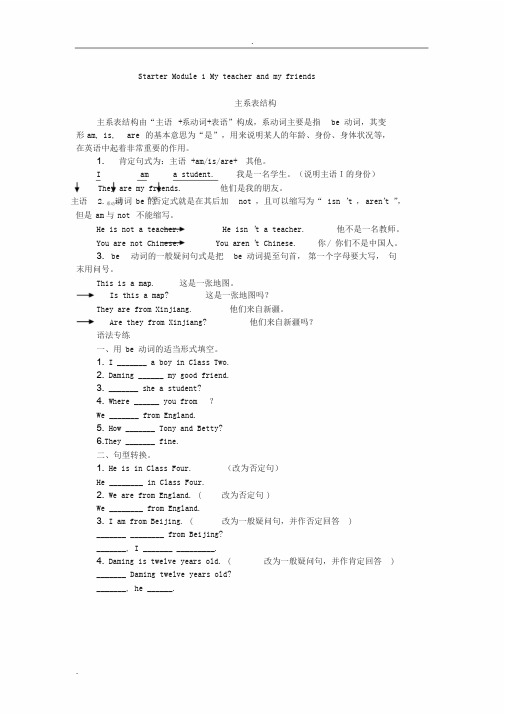
Starter Module 1 My teacher and my friends主系表结构主系表结构由“主语+系动词+表语”构成,系动词主要是指be 动词,其变形am, is, are 的基本意思为“是”,用来说明某人的年龄、身份、身体状况等,在英语中起着非常重要的作用。
1.肯定句式为:主语 +am/is/are+ 其他。
I am a student. 我是一名学生。
(说明主语I的身份)They are my friends. 他们是我的朋友。
主语 2.系动动词词 be表的语否定式就是在其后加not ,且可以缩写为“ isn ’t ,aren’t ”,但是am与not 不能缩写。
He is not a teacher. He isn ’t a teacher. 他不是一名教师。
You are not Chinese. You aren ’t Chinese. 你/ 你们不是中国人。
3.be 动词的一般疑问句式是把be 动词提至句首,第一个字母要大写,句末用问号。
This is a map. 这是一张地图。
Is this a map? 这是一张地图吗?They are from Xinjiang. 他们来自新疆。
Are they from Xinjiang? 他们来自新疆吗?语法专练一、用 be 动词的适当形式填空。
1. I _______ a boy in Class Two.2. Daming ______ my good friend.3. _______ she a student?4. Where ______ you from ?We _______ from England.5. How _______ Tony and Betty?6.They _______ fine.二、句型转换。
1. He is in Class Four. (改为否定句)He ________ in Class Four.2. We are from England. ( 改为否定句)We ________ from England.3. I am from Beijing. ( 改为一般疑问句,并作否定回答)_______ ________ from Beijing?_______, I _______ _________.4. Daming is twelve years old. ( 改为一般疑问句,并作肯定回答)_______ Daming twelve years old?_______, he ______.Starter Module 2 My English lesson祈使句2.祈使句可用来表示命令、请求和建议等意义的句子。
外研版七年级英语上册重点短语句式句型语法
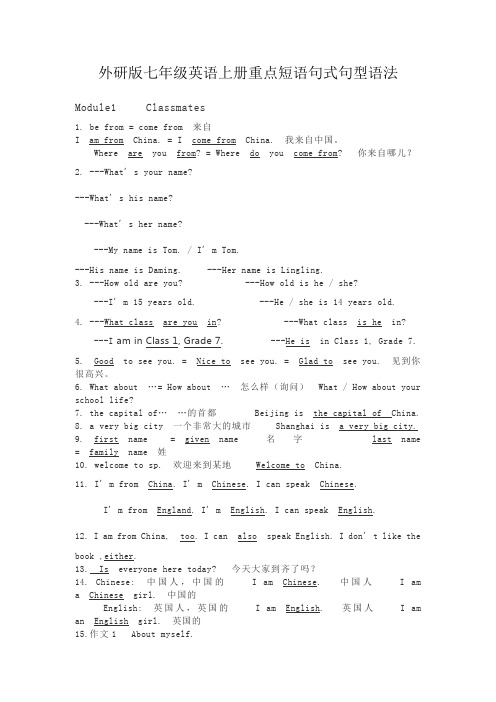
外研版七年级英语上册重点短语句式句型语法What is your mother? = What does your mother do? = What is your mother’s job?What be + 名词(主语)?What do / does + 主语+do? What be one’s job?16. 介绍家庭常用的句型。
1) This is a photo of my family.2) I have a big / small family.3) There are ____ people in my family. They are _____ and I.4) This is …and this is ….5) My father / mother is a ________ in a ________.6) I love my family very much. / I have a happy family.范文:My familyI have a big and happy family. There are six people in my family. They are my grandfather, grandmother, father, mother, my brother and me. This is my grandfather Henry. He is 65 years old. And Maria is my grandmother. She is 63 years old this year. These are my parents. My father is George,He is 37 years old. He is a doctor. My mother’s name is Sandra. She is34 years old. My little brother is Tom. He is an eight-year-old boy. My name is Lily and I am 12 years old. I am a student.I love my family.Module3 My schoolVocabulary:A: in the dining hall (have meals), in the library (read books), in the office (work),on the playground (do sports), in the sports hall (play tabletennis)on the blackboard, in the classroom, in the computer room (play computer)at the school gate, in the science lab, on the desk,a map, a television, a dictionary, a teaching building, a classroom building,a science building, an office building, some furnitureB: in, on, near = next to = beside, at / in front of, in the front of, on the left / right of,in the middle of, between…and…C:one, two, three, four, five, six, seven, eight, nine, ten,②对地点状语提问:提问地点用”Where is / are+主语”。
外研版七年级英语上册M1-10重点知识大全
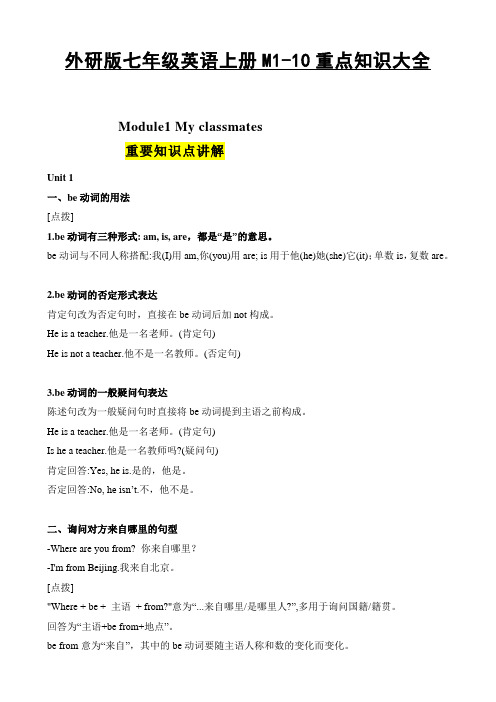
外研版七年级英语上册M1-10重点知识大全Module1 My classmates重要知识点讲解Unit 1一、be动词的用法[点拨]1.be动词有三种形式: am, is, are,都是“是”的意思。
be动词与不同人称搭配:我(I)用am,你(you)用are; is用于他(he)她(she)它(it);单数is,复数are。
2.be动词的否定形式表达肯定句改为否定句时,直接在be动词后加not构成。
He is a teacher.他是一名老师。
(肯定句)He is not a teacher.他不是一名教师。
(否定句)3.be动词的一般疑问句表达陈述句改为一般疑问句时直接将be动词提到主语之前构成。
He is a teacher.他是一名老师。
(肯定句)Is he a teacher.他是一名教师吗?(疑问句)肯定回答:Yes, he is.是的,他是。
否定回答:No, he isn’t.不,他不是。
二、询问对方来自哪里的句型-Where are you from? 你来自哪里?-I'm from Beijing.我来自北京。
[点拨]"Where + be + 主语+ from?"意为“...来自哪里/是哪里人?”,多用于询问国籍/籍贯。
回答为“主语+be from+地点”。
be from意为“来自”,其中的be动词要随主语人称和数的变化而变化。
三、用于确定对方国籍的句型-Hi, are you English too?嘿,你也是英国人吗?-No, I’m not. I’m American and my name is Betty King. 不,我不是。
我是美国人,我叫贝蒂·金。
[点拨]"Are you+国籍?"通常在没有把握确定对方国籍时用此句型。
该句是一般疑问句,肯定回答用“Yes,I am.”否定回答用“No,I'm not.”。
外研版七年级英语上册语法知识点汇总
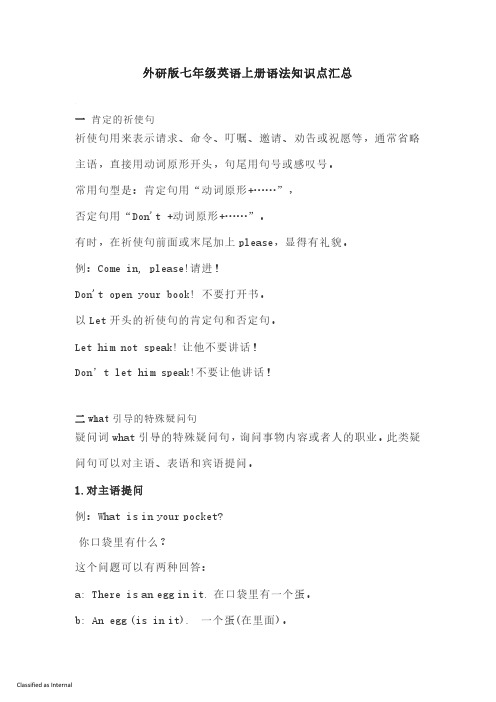
外研版七年级英语上册语法知识点汇总一肯定的祈使句祈使句用来表示请求、命令、叮嘱、邀请、劝告或祝愿等,通常省略主语,直接用动词原形开头,句尾用句号或感叹号。
常用句型是:肯定句用“动词原形+……”,否定句用“Don't +动词原形+……”。
有时,在祈使句前面或末尾加上please,显得有礼貌。
例:Come in, please!请进!Don't open your book! 不要打开书。
以Let开头的祈使句的肯定句和否定句。
Let him not speak!让他不要讲话!Don’t let him speak!不要让他讲话!二w hat引导的特殊疑问句疑问词what引导的特殊疑问句,询问事物内容或者人的职业。
此类疑问句可以对主语、表语和宾语提问。
1.对主语提问例:What is in your pocket?你口袋里有什么?这个问题可以有两种回答:a: There is an egg in it.在口袋里有一个蛋。
b: An egg(is in it). 一个蛋(在里面)。
-What are there in the room?屋子里有什么?-There are a lot of chairs in it. 里面有许多椅子。
注意:回答此句型的问题时,答句的单复数根据实际情况而定。
2.对宾语提问例:-What did you buy?-你买了什么?-I bought a bike.-我买了辆自行车。
3.对表语提问例:-What is this?-这是什么?-It's a bench. -这是一条长凳。
-What is your mother? -你妈妈是干什么的?-She is a teacher. 她是一名老师。
注意:What is+人? 此句型询问人的职业。
还可用What is sb's job?或者What does/do sb. do? 询问人的职业。
三情态动词can表请求情态动词can表请求can除了表示“能够(强调能力)”的含义,还可以表示“能否”的含义。
外研版|七年级英语上册各单元重点单词 短语 句型全汇总

外研版|七年级英语上册各单元重点单词短语句型全汇总Module 1 My Classmates重点短语:1.be from。
= come from。
来自。
2.years old。
岁3.what about。
= how about。
怎么样?4.in Class Ten。
Grade Seven 在七年级十班5.the capital of。
的首都/省会6.first name = given name 名st name = family name 姓8.English name 英文名字9.Chinese name 中文名字重点句子:1.I'm Chinese。
and I come from China。
我是中国人,我来自中国。
2.Where do they come from。
他们来自哪里?They come from XXX。
他们来自美国。
3.How old is that man。
那位男子多少岁了?He is forty-four。
他44岁。
4.The students are in Class Five。
Grade Seven。
这些学生在七年级五班。
5.XXX are in Class One。
汤姆和XXX在一班。
6.How about you。
= And you。
你呢?7.e to Class 6.Grade 7.欢迎到七年级六班。
8.Beijing is the capital of China。
北京是中国的首都。
9.Nice to see you。
很高兴见到你。
I am Tony Smith。
with Tony being my first name and Smith being my last name。
In this module。
we will be discussing my family.We have a photo of my family。
which XXX。
外研版七年级上册英语全册知识点归纳
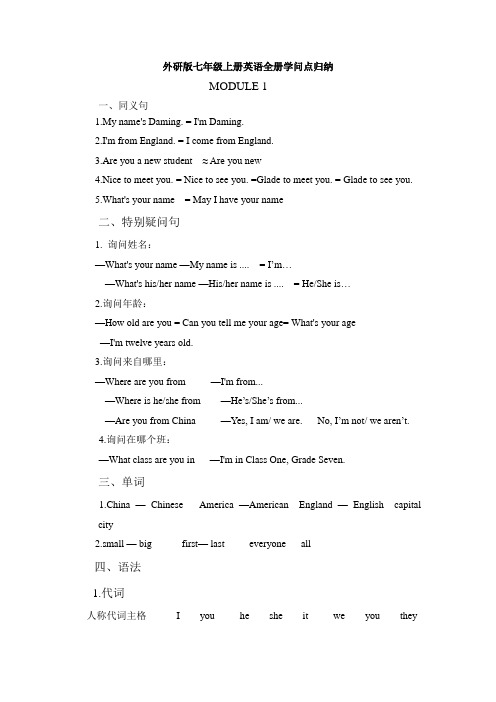
外研版七年级上册英语全册学问点归纳MODULE 1一、同义句1.My name's Daming. = I'm Daming.2.I'm from England. = I come from England.3.Are you a new student ≈ Are you new4.Nice to meet you. = Nice to see you. =Glade to meet you. = Glade to see you.5.What's your name = May I have your name二、特别疑问句1. 询问姓名:—What's your name —My name is .... = I’m…—What's his/her name —His/her name is .... = He/She is…2.询问年龄:—How old are you = Can you tell me your age= What's your age—I'm twelve years old.3.询问来自哪里:—Where are you from —I'm from...—Where is he/she from —He’s/She’s from...—Are you from China —Yes, I am/ we are. No, I’m not/ we aren’t.4.询问在哪个班:—What class are you in —I'm in Class One, Grade Seven.三、单词1.China —Chinese America —American England —English capitalcity2.small — big first— last everyone all四、语法1.代词人称代词主格I you he she it we you they形容词性物主代词〔…的〕my your his her its our your their 2.be动词:am I am= I’m I am not= I’m notis He /She is = He’s /She’s is not = isn’tare We /You /They are = We’re / You’re /They’re are not= aren’tMODULE 2一、单词grandparents grandfather—grandmother parents father—mother mum---dad daughter—son sister—brother aunt—uncle cousin husband---wife family woman---man women---men职业:job actor driver doctor manager nurse worker teacher policeman工作地点:factory hospital hotel office school theatre bus station shop二、短语a photo/picture of my family in front of in/at the front of next to on the right --- on the left三、语法1.this---that these---those I---we he/she/it---they2.名词全部格:Miss Li's =her Tom’s = hisLily and Lucy's 两人共有的eg: Lily and Lucy's desk is bigLily's and Lucy's 两人各有的Lily's and Lucy's desks are small.My parents’ room is very clean.四、句子1.---Is this your sister --- Yes, it is. No, it isn’t---Are these her books ---Yes, they are. No, they aren’t.2.---Who is this --- This is my brother.--- Who are they/these --- They are my cousins3. ---What’s your sister’s name---My sister’s name is…/Her name is…What does your father do=What is your father's job=What is your father ---He is a ...MODULE 3一、单词s: classroom, dining/sports hall, library, office, science lab, playground2.something: blackboard, book , room, computer, desk, furniture, map,wall, picture,television3.numbers: thirteen fourteen fifteen sixteen seventeen eighteen nineteenthirty forty fifty sixty seventy eighty ninety4.介词:next to ≈ near behind ≠ in front of in/at the front of:在......里面的前面in on under5. in the middle of on the left of--- on the right ofbetween …and… a map of our school6.right 正确的≠wrong右边的≠left二、句子1. Where is the office building It is between the dining hall and the library.2. How many students are there in your class There are 38 students in my class.三、语法(There be)----Are there any school offices----Yes, there are. There are some offices.----Is there a computer on Miss Li's desk----No, there isn't.留意:1.就近原那么:1). There is an orange and two apples on the desk.There are two apples and an orange on the desk.2). There are some students in the classroom.Are there any students in the classroom Yes, there are. No, there aren’t3〕There aren’t any students in the classroom.There isn’t an orange on the desk.MODULE 4一、family members:aunt uncle grandma grandmother grandpa grandfather mother father mum dad sister brother二、短语句型Thank you for your email.your help.helping me.asking me.inviting me.Make a family tree for your family.----How many people are there in your family----There are four. There are my mum and dad, my sister and me.----Have you got an aunt/any .....----Yes,I have./No,I haven't.----Have you got a small family or a big family----I've got a big family.or的用法:①或; (选择疑问句)②并列否认:I don't like swimming or dancing.MODULE 5-6一、单词1. orange 橙汁have some orange [U]橙色the oranges are orange [C]橙子This is an orange [C]2.kind 和善He is very kind.种类=tyre a kind / type of fruit two kinds /types of fruits3. gym: 不受天气影响的室内体育馆、健身房或运动馆stadium: 四周有看台的露天大型运动场4.healthy ≠ unhealthy keep/stay healthy保持安康in good health ≠ in poor/bad healthbe healthy = be in healthbe good for one’s health ≠be bad for one’s health名词变复数条件改变形式例词一般状况+ - s shops单词以s、x、ch、sh结尾+ - es buses 以辅音字母+y结尾去y为i + -es city-cities单词以“o〞结尾有生命+ - es tomatoes无生命+ - s zoos 一些以‘f’或‘fe’结尾的单词把’f‘或’fe‘变成’ves'knife-knives二、短语三、句型四、区分MODULE 7一、短语talktalk to sb. 跟某人谈话(一方讲一方听)talk with sb. 跟某人谈话(双方都讲)get up≠go to bedgo home≠leave home(for)study science/history/chemistry/maths/...二、语法①时辰表达法:What's the time =What time it is顺读法:It's two ten. 2:10 〔干脆读出数字〕逆读法:①It's ten past two.(2:10) ≤30'②It's ten to ten. (2:50) >30'整点表达法:It's two o'clock. (2:00) 留意:(不用介词)②一般如今时(1)【No. 1】一般如今时的功能1.表示事物或人物的特征、状态。
(完整)外研版七年级上英语重点语法
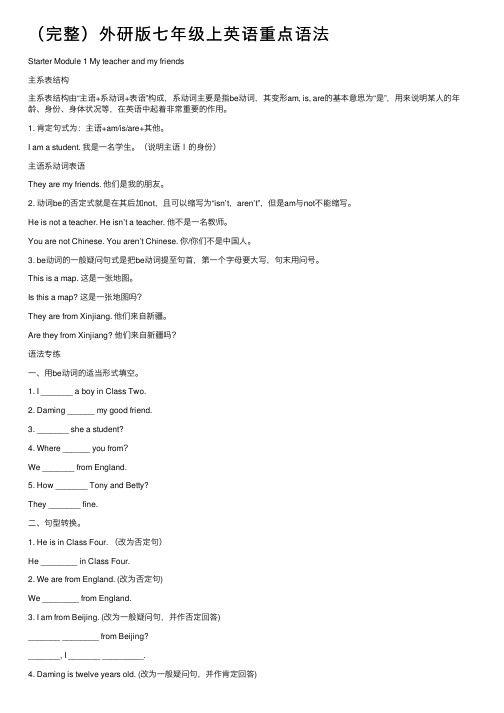
(完整)外研版七年级上英语重点语法Starter Module 1 My teacher and my friends主系表结构主系表结构由“主语+系动词+表语”构成,系动词主要是指be动词,其变形am, is, are的基本意思为“是”,⽤来说明某⼈的年龄、⾝份、⾝体状况等,在英语中起着⾮常重要的作⽤。
1. 肯定句式为:主语+am/is/are+其他。
I am a student. 我是⼀名学⽣。
(说明主语I的⾝份)主语系动词表语They are my friends. 他们是我的朋友。
2. 动词be的否定式就是在其后加not,且可以缩写为“isn’t,aren’t”,但是am与not不能缩写。
He is not a teacher. He isn’t a teacher. 他不是⼀名教师。
You are not Chinese. You aren’t Chinese. 你/你们不是中国⼈。
3. be动词的⼀般疑问句式是把be动词提⾄句⾸,第⼀个字母要⼤写,句末⽤问号。
This is a map. 这是⼀张地图。
Is this a map? 这是⼀张地图吗?They are from Xinjiang. 他们来⾃新疆。
Are they from Xinjiang? 他们来⾃新疆吗?语法专练⼀、⽤be动词的适当形式填空。
1. I _______ a boy in Class Two.2. Daming ______ my good friend.3. _______ she a student?4. Where ______ you from?We _______ from England.5. How _______ Tony and Betty?They _______ fine.⼆、句型转换。
1. He is in Class Four. (改为否定句)He ________ in Class Four.2. We are from England. (改为否定句)We ________ from England.3. I am from Beijing. (改为⼀般疑问句,并作否定回答)_______ ________ from Beijing?_______, I _______ _________.4. Daming is twelve years old. (改为⼀般疑问句,并作肯定回答)_______ Daming twelve years old?_______, he ______.Starter Module 2 My English lesson祈使句1. 祈使句可⽤来表⽰命令、请求和建议等意义的句⼦。
七年级上册外研版英语课堂笔记

七年级上册外研版英语课堂笔记一、Module 1 My classmates。
1. 重点单词。
- nice:adj. 美好的;令人愉快的。
例如:She is a nice girl.(她是一个好女孩。
)- to:prep. 到;向。
例如:Welcome to Beijing.(欢迎来到北京。
)- meet:v. 遇见;结识。
例如:Nice to meet you.(很高兴见到你。
)- classmate:n. 同学。
例如:He is my classmate.(他是我的同学。
)- his:pron. 他的。
例如:His name is Tom.(他的名字是汤姆。
)- her:pron. 她的。
例如:Her book is very interesting.(她的书非常有趣。
)2. 重点短语。
- be from:来自。
例如:I am from China.(我来自中国。
)- Nice to meet you:很高兴见到你。
这是初次见面时常用的打招呼用语,回答通常是“Nice to meet you too”。
3. 重点句型。
- What's your name? 你叫什么名字?这是询问他人名字的常用句型,回答可以是“My name is...”或者“I'm...”。
- I'm from... 我来自……,用来介绍自己的籍贯。
例如:I'm from Shanghai.(我来自上海。
)二、Module 2 My family。
- family:n. 家;家庭。
例如:This is my family.(这是我的家庭。
)- father:n. 父亲;爸爸。
例如:My father is a teacher.(我的爸爸是一名教师。
)- mother:n. 母亲;妈妈。
例如:My mother likes cooking.(我的妈妈喜欢做饭。
)- sister:n. 姐妹。
例如:My sister is a student.(我的姐姐是一名学生。
七年级英语语法学习:外研版

七年级英语语法学习:外研版第一章:名词1.1 名词的分类- 专有名词:表示人、地点、组织、事物等专有名称。
如:China, Beijing, UN, Microsoft.- 普通名词:表示一类事物或抽象概念。
如:book, student, happiness.1.2 名词的数- 单数名词:表示一个事物。
如:cat, pen.- 复数名词:表示两个或两个以上的事物。
如:cars, pencils.1.3 名词的所有格- 单数名词的所有格:在名词后加's。
如:Tom's book.- 复数名词的所有格:在名词后加's,若名词以s、sh、ch结尾,则加'。
如:the students' books, the churches'.第二章:代词2.1 代词的分类- 人称代词:指代特定的人。
如:I, you, he, she, it, we, they.- 物主代词:表示所有关系。
如:my, your, his, her, its, our, their.- 反身代词:指代主语本身。
如:myself, yourself, himself, herself, itself, ourselves, yourselves, themselves.2.2 代词的数和格- 单数代词:与单数名词一致。
如:he, it.- 复数代词:与复数名词一致。
如:they.- 所有格代词:与名词所有格一致。
如:their, his.第三章:形容词和副词3.1 形容词- 形容词用来修饰名词,表示事物的特征、状态等。
如:big, tall, happy.3.2 副词- 副词用来修饰动词、形容词、其他副词或整个句子,表示程度、时间、地点等。
如:quickly, always, here.3.3 形容词和副词的比较级和最高级- 比较级:表示两个事物之间的比较。
如:bigger, taller.- 最高级:表示多个事物之间的最高程度。
初中英语新外研版七年级上册Unit 1 A new start语法讲解(2024秋)
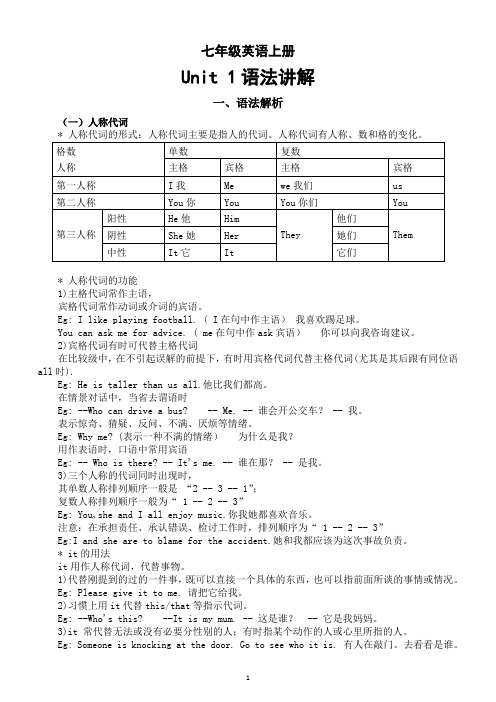
七年级英语上册Unit 1语法讲解一、语法解析(一)人称代词* 人称代词的功能1)主格代词常作主语,宾格代词常作动词或介词的宾语。
Eg: I like playing football. ( I在句中作主语)我喜欢踢足球。
You can ask me for advice. ( me在句中作ask宾语)你可以向我咨询建议。
2)宾格代词有时可代替主格代词在比较级中,在不引起误解的前提下,有时用宾格代词代替主格代词(尤其是其后跟有同位语all时).Eg: He is taller than us all.他比我们都高。
在情景对话中,当省去谓语时Eg: --Who can drive a bus? -- Me. -- 谁会开公交车? -- 我。
表示惊奇、猜疑、反问、不满、厌烦等情绪。
Eg: Why me? (表示一种不满的情绪)为什么是我?用作表语时,口语中常用宾语Eg: -- Who is there? -- It's me. -- 谁在那? -- 是我。
3)三个人称的代词同时出现时,其单数人称排列顺序一般是“2 -- 3 -- 1”;复数人称排列顺序一般为“ 1 -- 2 -- 3”Eg: You,she and I all enjoy music.你我她都喜欢音乐。
注意:在承担责任、承认错误、检讨工作时,排列顺序为“ 1 -- 2 -- 3”Eg:I and she are to blame for the accident.她和我都应该为这次事故负责。
* it的用法it用作人称代词,代替事物。
1)代替刚提到的过的一件事,既可以直接一个具体的东西,也可以指前面所谈的事情或情况。
Eg: Please give it to me. 请把它给我。
2)习惯上用it代替this/that等指示代词。
Eg: --Who's this? --It is my mum. -- 这是谁? -- 它是我妈妈。
外研版英语七上Module3重要单词语法点总结
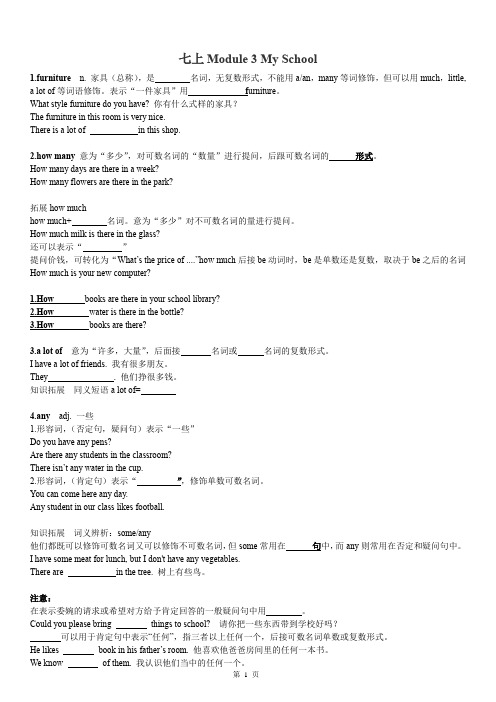
七上Module 3 My School1.furniture n. 家具(总称),是名词,无复数形式,不能用a/an,many等词修饰,但可以用much,little,a lot of等词语修饰。
表示“一件家具”用f urniture。
What style furniture do you have? 你有什么式样的家具?The furniture in this room is very nice.There is a lot of in this shop.2.how many 意为“多少”,对可数名词的“数量”进行提问,后跟可数名词的形式。
How many days are there in a week?How many flowers are there in the park?拓展how muchhow much+名词。
意为“多少”对不可数名词的量进行提问。
How much milk is there in the glass?还可以表示“”提问价钱,可转化为“What’s the price of ....”how much后接be动词时,be是单数还是复数,取决于be之后的名词How much is your new computer?1.How books are there in your school library?2.How water is there in the bottle?3.How books are there?3.a lot of 意为“许多,大量”,后面接名词或名词的复数形式。
I have a lot of friends. 我有很多朋友。
They. 他们挣很多钱。
知识拓展---同义短语a lot of=4.any adj. 一些1.形容词,(否定句,疑问句)表示“一些”Do you have any pens?Are there any students in the classroom?There isn’t any water in the cup.2.形容词,(肯定句)表示“”,修饰单数可数名词。
外研版七年级上册短语与重点句型
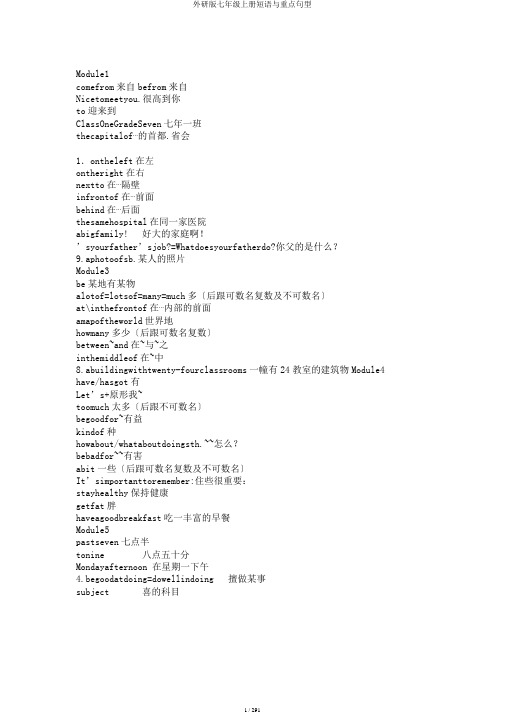
Module1comefrom来自befrom来自Nicetomeetyou.很高到你to迎来到ClassOneGradeSeven七年一班thecapitalof⋯的首都.省会1.ontheleft在左ontheright在右nextto在⋯隔壁infrontof在⋯前面behind在⋯后面thesamehospital在同一家医院abigfamily! 好大的家庭啊!’syourfather’sjob?=Whatdoesyourfatherdo?你父的是什么?9.aphotoofsb.某人的照片Module3be某地有某物alotof=lotsof=many=much多〔后跟可数名复数及不可数名〕at\inthefrontof在⋯内部的前面amapoftheworld世界地howmany多少〔后跟可数名复数〕between~and在~与~之inthemiddleof在~中8.abuildingwithtwenty-fourclassrooms一幢有24教室的建筑物Module4 have/hasgot有Let’s+原形我~toomuch太多〔后跟不可数名〕begoodfor~有益kindof种howabout/whataboutdoingsth.~~怎么?bebadfor~~有害abit一些〔后跟可数名复数及不可数名〕It’simportanttoremember:住些很重要:stayhealthy保持健康getfat胖haveagoodbreakfast吃一丰富的早餐Module5pastseven七点半tonine 八点五十分Mondayafternoon 在星期一下午4.begoodatdoing=dowellindoing 擅做某事subject 喜的科目talkwithsb=talktosb.与某人交谈onweekdays在工作日getup起床havebreakfast/havelunch/havedinner吃早餐/午餐/晚餐10.starttodo=begintodo 开始做watchTV看电视doone’shomework做作业gotobed去睡觉gotosleep去睡觉haveabreak/havearest休息片刻haveclasses/lessons上课WelcometoBeijingZoo.欢送到北京动物园。
外研版英语七年级上册语法总结
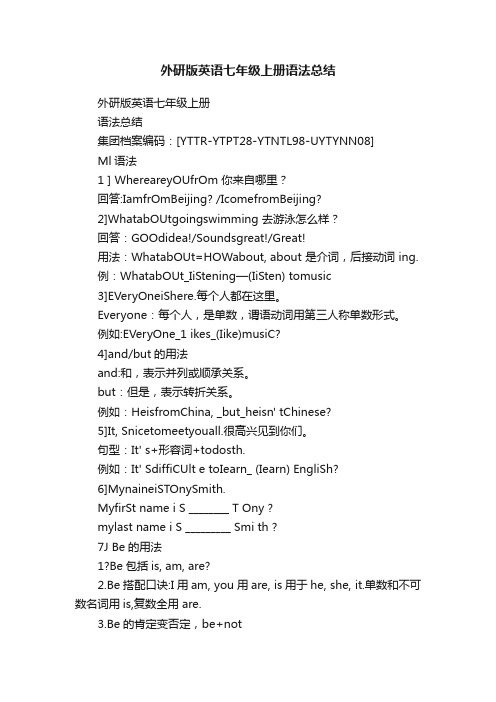
外研版英语七年级上册语法总结外研版英语七年级上册语法总结集团档案编码:[YTTR-YTPT28-YTNTL98-UYTYNN08]Ml语法1 ] WhereareyOUfrOm 你来自哪里?回答:IamfrOmBeijing? /IcomefromBeijing?2]WhatabOUtgoingswimming 去游泳怎么样?回答:GOOdidea!/Soundsgreat!/Great!用法:WhatabOUt=HOWabout, about 是介词,后接动词 ing.例:WhatabOUt_IiStening—(IiSten) tomusic3]EVeryOneiShere.每个人都在这里。
Everyone:每个人,是单数,谓语动词用第三人称单数形式。
例如:EVeryOne_1 ikes_(Iike)musiC?4]and/but的用法and:和,表示并列或顺承关系。
but:但是,表示转折关系。
例如:HeisfromChina, _but_heisn' tChinese?5]It, Snicetomeetyouall.很高兴见到你们。
句型:It' s+形容词+todosth.例如:It' SdiffiCUlt e toIearn_ (Iearn) EngliSh?6]MynaineiSTOnySmith.MyfirSt name i S ________ T Ony ?mylast name i S _________ Smi th ?7J Be的用法1?Be包括is, am, are?2.Be搭配口诀:I用am, you用are, is用于he, she, it.单数和不可数名词用is,复数全用 are.3.Be的肯定变否定,be+not4.Be的缩写:Iam=I, m;youare=you^ reheis二he' s;SheiS=she" S;itis=it, s;WhatiS=What, S 5.Be的疑问句:Be+主语+其他?回答:Yes,主语+be. /No,主语+benot?M2语法1]What/How引导的感叹句What+a∕an÷形容词+名词+ (主语+谓语)!二How+形容词/副词+主语+谓语!Whatabigfam订y(itis)!=Howbigthefamilyis! WhatfineWeather(itis)!=HOWfinetheweatheris!2]infrontof 在前面/inthefrontof 在前部3]名词所有格两人共有:AandB,s÷is两人分别有:A, SandB, s+are例如:MrSGreeniS _A mother,A.LingIingandLUCy, SB.LingIing^ SandLUcy, SC.Lingling' SandLUCy4]合成词合成词变复数,一般悄况,后面的单词变复数。
- 1、下载文档前请自行甄别文档内容的完整性,平台不提供额外的编辑、内容补充、找答案等附加服务。
- 2、"仅部分预览"的文档,不可在线预览部分如存在完整性等问题,可反馈申请退款(可完整预览的文档不适用该条件!)。
- 3、如文档侵犯您的权益,请联系客服反馈,我们会尽快为您处理(人工客服工作时间:9:00-18:30)。
Starter Module 1 My teacher and my friends主系表结构主系表结构由“主语+系动词+表语”构成,系动词主要是指be动词,其变形am, is, are的基本意思为“是”,用来说明某人的年龄、身份、身体状况等,在英语中起着非常重要的作用。
1. 肯定句式为:主语+am/is/are+其他。
I am a student. 我是一名学生。
(说明主语I的身份)主语系动词表语They are my friends. 他们是我的朋友。
2. 动词be的否定式就是在其后加not,且可以缩写为“isn’t,aren’t”,但是am与not不能缩写。
He is not a teacher. He isn’t a teacher. 他不是一名教师。
You are not Chinese. You aren’t Chinese. 你/你们不是中国人。
3. be动词的一般疑问句式是把be动词提至句首,第一个字母要大写,句末用问号。
This is a map. 这是一张地图。
Is this a map? 这是一张地图吗?They are from Xinjiang. 他们来自新疆。
Are they from Xinjiang? 他们来自新疆吗?语法专练一、用be动词的适当形式填空。
1. I _______ a boy in Class Two.2. Daming ______ my good friend.3. _______ she a student?4. Where ______ you from?We _______ from England.5. How _______ Tony and Betty?They _______ fine.二、句型转换。
1. He is in Class Four. (改为否定句)He ________ in Class Four.2. We are from England. (改为否定句)We ________ from England.3. I am from Beijing. (改为一般疑问句,并作否定回答)_______ ________ from Beijing?_______, I _______ _________.4. Daming is twelve years old. (改为一般疑问句,并作肯定回答)_______ Daming twelve years old?_______, he ______.Starter Module 2 My English lesson祈使句1. 祈使句可用来表示命令、请求和建议等意义的句子。
它的主语you通常省略,谓语动词用原形,表达的是将来的动作。
句末用感叹号或句号。
Stand up, please. 请站起来。
Sit down! 坐下!2. 为了表示委婉的语气,可在句首或句尾加上please,但please加在句尾时,前面要用逗号隔开。
Please put up your hands. 请举手。
Close your books, please. 请合上书。
3. 为了明确向对方提出请求或发出命令,可加称呼语,但称呼语要用逗号与句子隔开。
Open your books, boys and girls. 同学们打开你们的书。
Please listen to me, Lingling. 玲玲,请听我说。
基数词1. 基数词就是用来表示数量的单词。
英语中就基数词提问时,用how many。
How many boys are there in your class?你们班里有多少男生?There are nineteen boys. 有19个男孩。
2. 基数词的书写。
①1~10:one, two, three, four, five, six, seven, eight, nine, ten②11~20: eleven, twelve, thirteen, fourteen, fifteen,sixteen, seventeen, eighteen, nineteen, twenty③整十:ten, twenty, thirty, forty, fifty, sixty, seventy, eighty, ninety④其他数字:整十-个位数twenty-two 22 forty-five 45 fifty-three 53语法专练一、用祈使句表达下面图片的内容。
1. 请写在黑板上。
__________________________________________2. 举起你的手。
__________________________________________3. 星期三我们一起去游泳吧。
__________________________________________二、写出对应的英语数词。
8 _____________ 20 ____________29 _____________ 46 ____________12 _____________ 19 ____________83 _____________ 94 ____________Starter Module 3 My English book特殊疑问句1. 特殊疑问句由特殊疑问词来引导。
目前我们学过what, how, how many, how old, what colour等引导的一般疑问句。
What’s your name, pleasse? 请问你叫什么名字?How are you? 你好吗?How many boys are there? 这里有多少男孩?How old are you? 你多大了?What colour is the cat? 这只猫是什么颜色的?2. 特殊疑问句的语序为“特殊疑问词+一般疑问句”,特殊疑问词在句中有两个作用:一是起引导作用,二是在句中担当一定的句子成分。
What’s your telephone number? 你的电话号码是多少?How do you spell “pencil”? 你怎样拼写“pencil”?What’s this in English? 这个用英语怎么说?What class are you in? 你在哪个班?语法专练根据答语写出问句1. _______________________________________It’s a map.2. _______________________________________It’s black.3. _______________________________________It’s C-L-A-S-S-R-O-O-M.4. _______________________________________I’m fine, thank you.5. _______________________________________I’m Mike.6. _______________________________________It’s 987654321.7. _______________________________________I’m in Class Three, Grade Seven.8. _______________________________________I’m twelve.9. _______________________________________There are 54 students in my class.Starter Module 4 My everyday life特殊疑问句what引导的特殊疑问句,可以询问星期几,天气,最喜欢的体育运动,在几年级几班等等。
1. 特殊疑问词what day提问星期几。
这是常用it来指代时间作主语,也可以用today, tomorrow等名词作主语。
答语用It is…或Today/Tomorrow is…。
What day is it today? 今天星期几?It is Monday. 今天星期一。
What day is it tomorrow? 明天星期几?Tomorrow is Tuesday. 明天星期二。
2. 询问天气用What’s the weather like?来提问,what’s是what is的缩写。
根据句意表达需要,句型后可以加时间或地点状语,同时出现时间和地点时,一般先说地点后说时间。
答语用it来指代天气。
What’s the weather like in Xi’an in summer? 夏天西安的天气怎么样?It’s hot. 天气很热。
3. What’s your favourite…? 用来提问“你最喜欢的……是……”,favourite后跟名词。
答语用It’s…或直接用名词作简略回答。
What’s your favourite day? 你最喜欢星期几?Sunday. 星期天。
What’s your favourite animal? 你最喜欢的动物是什么?It’s dog. 是狗。
语法专练根据答语完成对话中的特殊疑问句。
1. _______ ______ ______ ______ today?Today is Wednesday.2. _______ ______ ______ ______ ?It’s yellow.3. _______ ______ _______ ______ in summer?Swimming.4. _______ your favourite sport?Basketball.5. _______ ______ ______ ______ in autumn?It’s cool.Module 1 My classmatesbe动词的用法一、动词be作谓语时,和后面的表语一起构成系表结构,说明主语的身份、年龄、状态等。
1. 说明身份。
I’m your teacher and you’re my students. 我是你们的老师,你们是我的学生。
Tony and Betty are our friends. 托尼和贝蒂是我们的朋友。
2. 说明年龄。
I’m thirteen years old. 我13岁。
Emma is thirteen years old too. 艾玛也是13岁。
3. 说明状态。
We are in our classroom now. 我们现在在教师里。
Shanghai is a very big city. 上海是一个非常大的城市。
